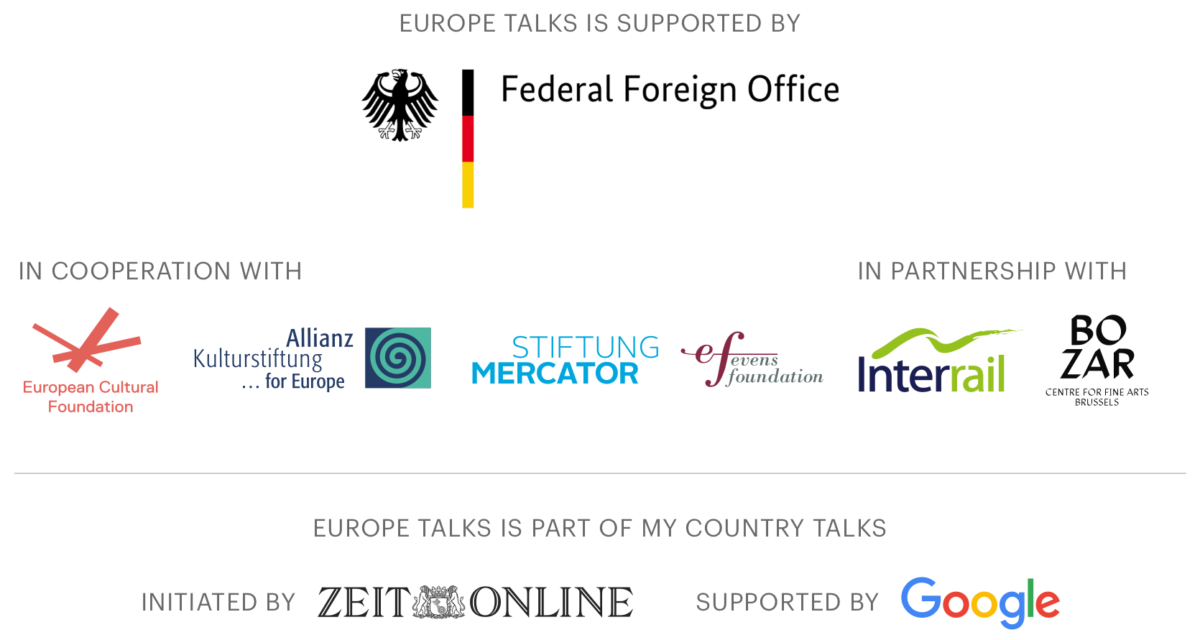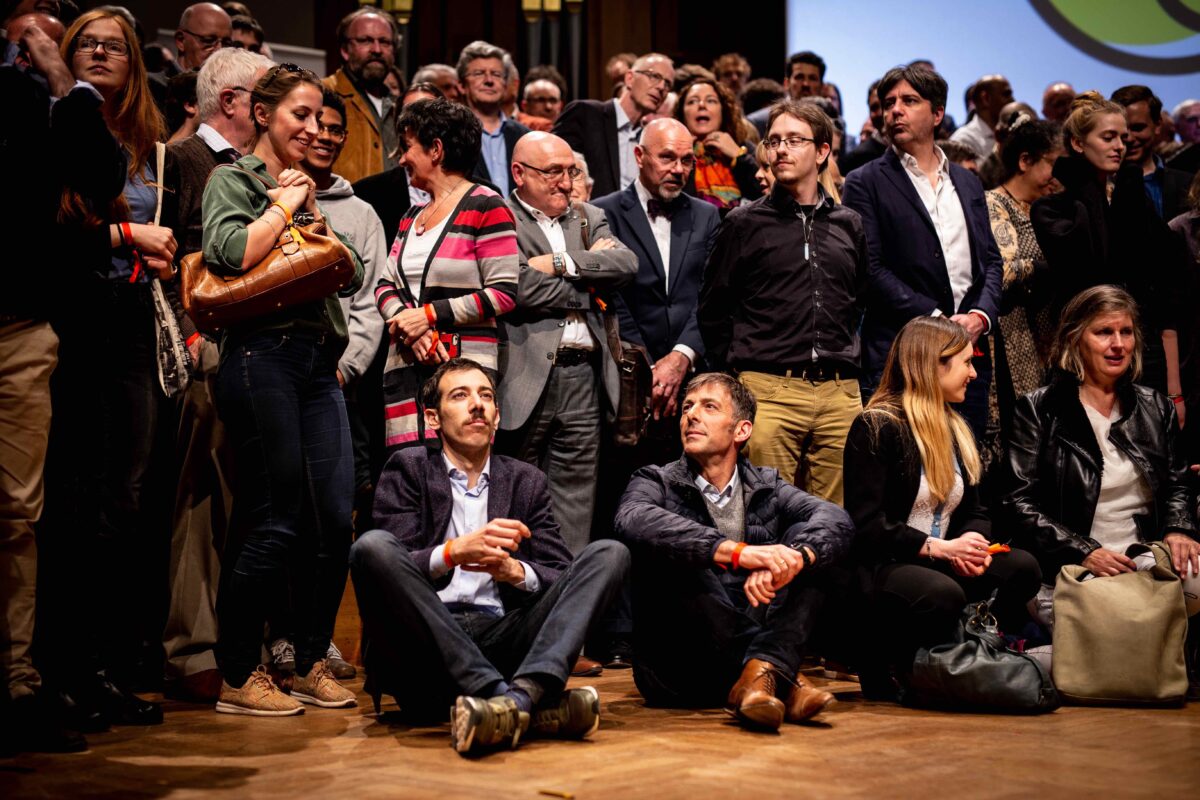
by Viola Kiel
Is it possible to hold a debate across Europe, despite language
barriers and national borders? Thousands did as part of Europe Talks,
which kicked off in Brussels.
Two weeks before the European elections, 16 European media partners
and numerous supporters jointly called on Europeans to meet and discuss
beyond national borders. On May 11, thousands of Europeans met for a
political one-on-one conversation in person or online.
There are many different kinds of voices in
Europe. There are loud ones and quiet ones, shrill ones and softer ones.
Together, they undoubtedly have the potential of uniting into something
greater, something more complete – a choir even. How, though – and this
is perhaps one of the core problems facing European society – is that
supposed to happen when national discourses and discussions seldom reach
beyond national borders? When citizens of one country constantly bicker
only among themselves?
On the afternoon of Saturday, May 11,
thousands of Europeans met up in pairs – either via video chat or in
person – to talk and to listen.
They were all part of Europe
Talks, an initiative from ZEIT ONLINE in cooperation with 15 media
partners from around Europe that brought together European neighbors
holding political views as divergent from each other as possible on
issues such as: Does the EU improve the lives of its citizens? Should
European countries increase taxes on gas to save the climate? And: Are
there too many immigrants in Europe? An algorithm paired up more than
16,200 participants to take part in face-to-face debates, all at the
same time.

"What is happening today never happened
in the history of Europe. Today, thousands of people from 33 countries
will meet a stranger from another country – from the very north of
Norway to La Gomera," said Jochen Wegner, editor-in-chief of ZEIT
ONLINE, at the kick-off event in the Palais des Beaux Arts in Brussels.
He recounted how the project got started – as a kind of political Tinder
that first resulted in Germany Talks in 2017. Then came a larger repeat
of that event in 2018, along with spin-off events in countries around
Europe. There have been 13 My Country Talks national events thus far.
And then came this year's pan-European experiment, Europe Talks, held on
the eve of elections for the European Parliament, which take place from
May 23-26.
"You have an interesting date today," Michelle
Müntefering, the next to speak, told the 500 participants present in
Brussels. Müntefering is minister of state for culture and education at
the German Federal Foreign Office and a member of the center-left Social
Democrats. And after warning of "destructive antagonists" who are keen
to steal Europe's future, she said something that could perhaps be seen
as the leitmotif of the entire format: National answers are no longer
enough.
The fact that such purely national responses might be
reduced by an event such as this one is something also hinted at by the
British journalist Jeremy Cliffe. The head of the Economist's Brussels
bureau, he referred to Europe Talks as a "phenomenal democratic
exercise."
"We're not together because of our history, but because of our future."
Jeremy Cliffe, journalist with the Economist
Cliffe was also critical of many
pro-Europeans for their constant appeals to the common history of the
continent. Europe has been shaped by its common history, he noted, but
recent crises cannot be solved by referring to tradition. It is
something else that unifies Europe: "It is hard reality that keeps
Europe together, the challenges we share," he said. "We're not together
because of our history, but because of our future."
"I Am, We Are, Europe's History"
Who, though, might be part of this history despite not being sufficiently recognized as such? Yasmine Ouirhrane asked at the very beginning of her speech whether she looked like a European – a question that pointed to a problem in European society: the fact that the children and grandchildren of migrants are still discriminated against merely because of their appearances. Ouirhrane, who was recently honored as the Young European of the Year by Schwarzkopf Foundation Young Europe, is the daughter of Italian-Moroccan parents.
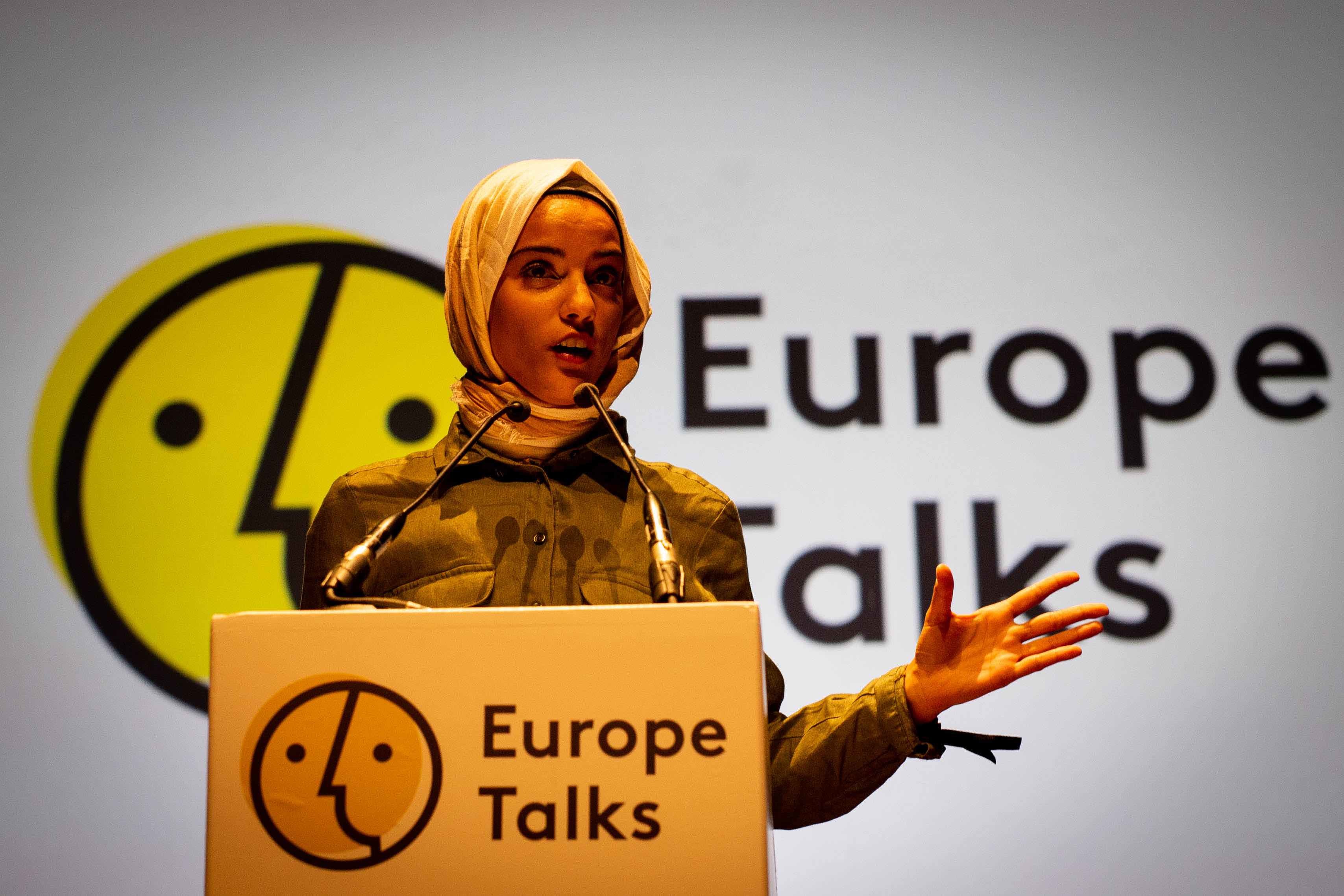
She completed her university studies in France and is an activist
on behalf of women and migrants in Europe. The 23-year-old, who proudly
refers to herself as a European of African descent, says that young
people, women and minorities are often ignored in the discussion of
European history. "Today, we represent the unity in diversity of Europe.
We, People of Color, daughters and sons of immigrants, we belong."
The
Belgian philosopher Philippe Van Parijs, professor emeritus at the
Université Louvain in Belgium, also spoke of cooperation – and about
practical measures to achieve it: a shared language.
An instrument for cross-border communication, he said, is a fundamental
precondition for the preservation of an "imperfect but amazing" system,
such as Europe. And this instrument exists, he said: English. The
English language, Van Parijs said, is "a continental European language"
with influences from German and French. And in speaking with this
European voice, it is in no way embarrassing to speak English with a
clear local accent, Van Parijs said. Like all speakers on Saturday
afternoon, he delivered his comments in English.
"Let us give to the world the gift of a strong Europe in which European values play an important role in shaping the future of humanity in this beautiful small spaceship Earth that we inhabit."
Samantha Cristoforetti, ESA astronaut
For Samantha Cristoforetti, the final keynote speaker at the BOZAR, a shared language was a matter of survival over the course of several months. In 2014, the Italian astronaut traveled on behalf of the European Space Agency (ESA) to the ISS, the "outpost of humanity," as Cristoforetti referred to the space station.
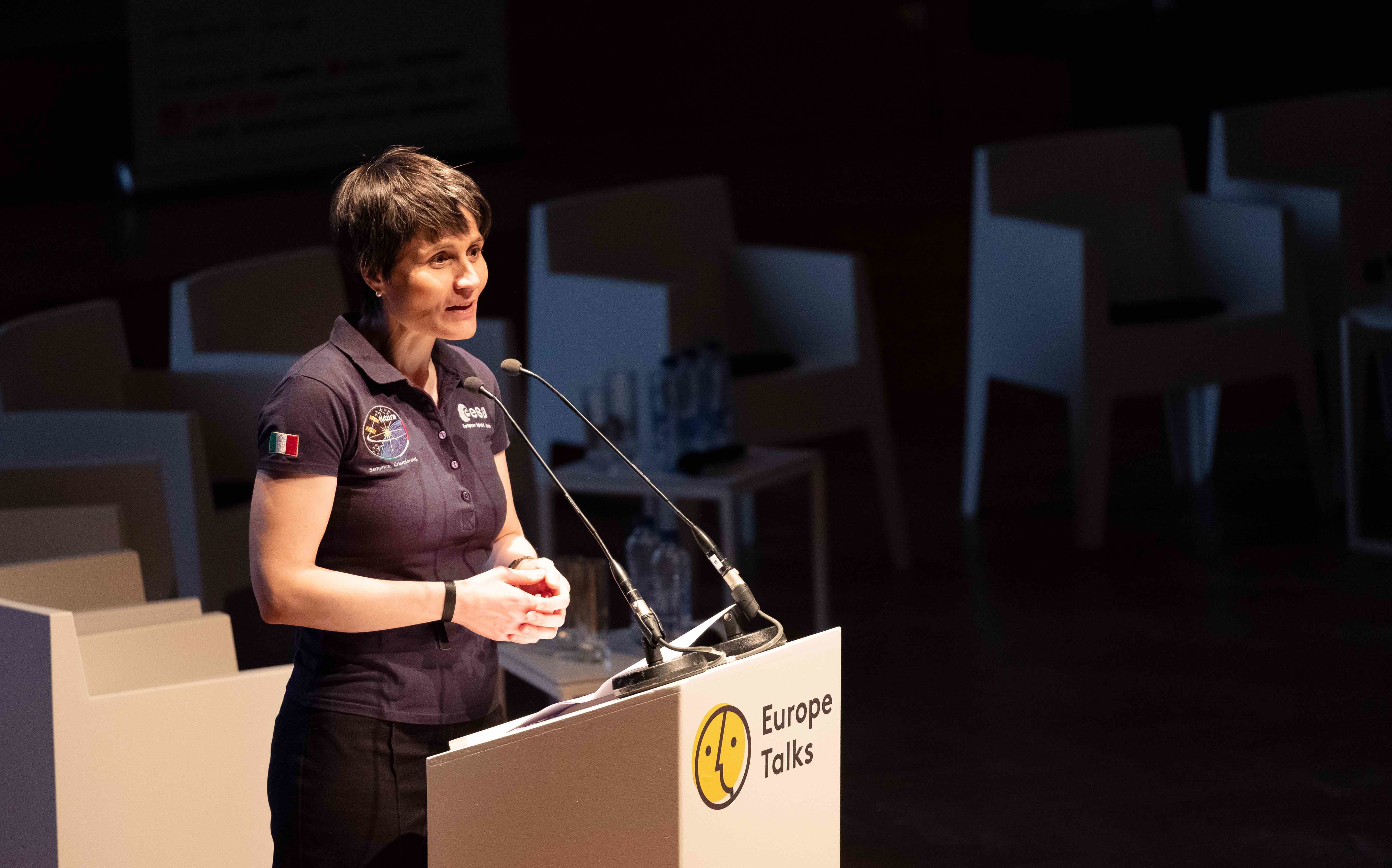
"Having spent quite some time of my life outside of Europe, even
outside of the planet," she said, "I can say it is a continent that
enjoys great admiration." Europe, she says, is home to huge amounts of
potential when it comes to talent, passion, creativity and, not least,
financial resources. As such, it is possible together to find
technological solutions to the problems facing the world - from global
health to the climate crisis. "We should honestly acknowledge problems,
we should be willing to change course as needed, but let us continue to
pursue the dream. Let us give to the world the gift of a strong Europe
in which European values play an important role in shaping the future of
humanity in this beautiful small spaceship Earth that we inhabit."
How, though, is it possible to launch a conversation on a small scale
that is able to make shared dreams possible? Especially when we have
competing views on questions central to our cooperation?
That's something that three debate pairs, all of whom took part in events that preceded Europe Talks, discussed in Brussels on Saturday before the discussions got started.
Enrico Verno and Anna Albanese, who were matched up in Italy as part of the national event L'Italia si parla, experienced something that tends to characterize the discussions held as part of this political Tinder – something that, as Verno described it, is different than "what happens on your mobile phone screen." They discovered during their meeting that there were many areas where their views overlapped.
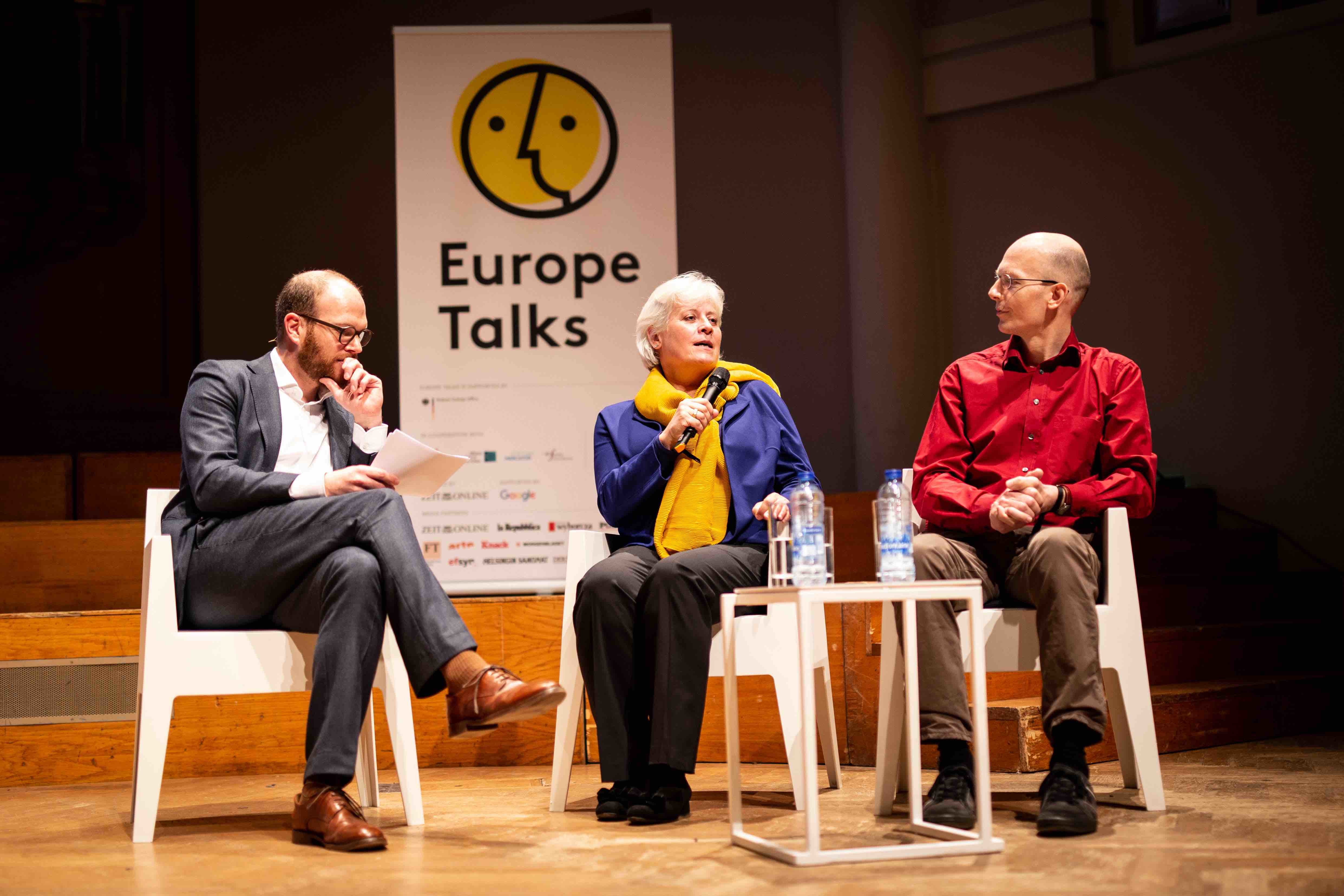
Anne Helgers and Anno Mühlhoff took part in the very first
version of the format, Germany Talks, back in 2017, a time when the
country was embroiled in a discussion about gay marriage. Did their
debate have a lasting effect? "I think more about communication, about
how I talk about things, especially when involved in a discussion where
my position is really diametrically opposed to that of the person I am
speaking with. I'm no longer afraid of such discussions. I used to be
brave. And now I am again," said Helgers. At the time, she was living in
a domestic partnership and, according to Mühlhoff, had prepared
meticulously for their debate. He said she managed to "soften" the
rather inflexible opinions he had held previously.
Jussi Ruotsalainen and Paula Plysjik of Finland met up as part of
Suomi puhuu and found themselves primarily in disagreement on the
question as to humanity's responsibility for climate change. Paula
Plysjik's conviction that humanity, in this world made by a Creator, was
too insignificant to actually change the climate was met with
scientific arguments presented by Jussi Ruotsalainen. Neither of them
abandoned their positions in the course of their debate, but
Ruotsalainen said: "I am able to respect views that I don't share, views
that I didn't even previously know existed."
See what our partners had to say






